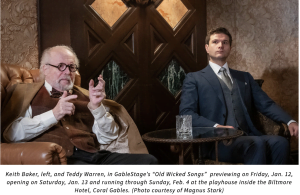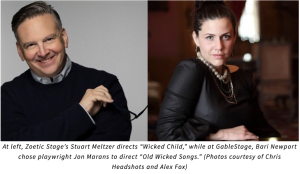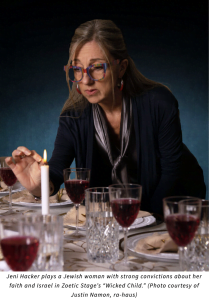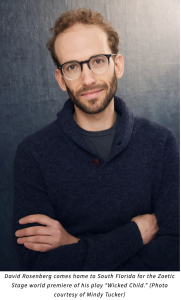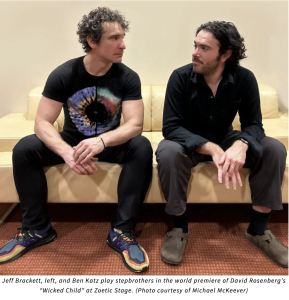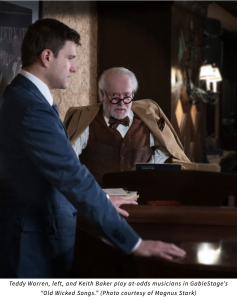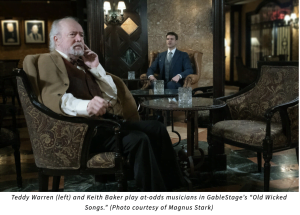Written By Christine Dolen
Originally published on artburstmiami.com.
Although both productions were in the works long before the Oct. 7 Hamas attack on Israel, a pair of plays – each, coincidentally, with the word “Wicked” in its title – will open this coming weekend at two regional theaters in Miami-Dade County.
Inevitably, the war that has raged ever since that shocking incursion from Gaza and its retaliatory aftermath will thrum through the minds of many theatergoers as they watch Zoetic Stage’s world premiere of Miami native David Rosenberg’s “Wicked Child” and GableStage’s production of “Old Wicked Songs,” a 1996 Pulitzer Prize finalist written and directed by Jon Marans (the musical “Rent” won the prize that year).

Though neither play is specifically about the reignited turmoil in the Middle East – “Wicked Child” is set in 2022-2023, “Old Wicked Songs” in 1986 – powerful art invites context and connections. With themes including antisemitism and the enduring trauma of the Holocaust, the plays have much to say in this volatile moment.
“Unfortunately, these plays always have resonance,” says Bari Newport, GableStage’s producing artistic director, who worked for two years to get “Old Wicked Songs” to its Miami-Dade debut. “Oct. 7 has re-catapulted so many deep-seated issues into the forefront again . . . That’s how the zeitgeist happens.”
Zoetic Stage’s producing artistic director Stuart Meltzer, who is directing “Wicked Child,” wants people to arrive at the theater ready to take in conflicting points of view.
“I hope audiences don’t come in with their dukes up. I hope they’re ready to listen,” says Meltzer. “We don’t want to anger anyone. We want to engage people.”

“Wicked Child,” which previews Thursday, Jan. 11, and opens Friday, Jan. 12, in the Carnival Studio Theater at Miami’s Arsht Center, underwent a Zoetic developmental process in which Meltzer and playwright Michael McKeever, who appears in the world premiere, both played a part. Initially, the play seems to be a dramedy about an extended Jewish family gathering for a Passover seder in affluent Rye, New York.
The older generation – Fay (Jeni Hacker) and her husband Mark (McKeever), Fay’s sister Cindy (Margery Lowe) and her husband Leo (Wayne LeGette) – isn’t especially religious, but this tradition and family mean a great deal to them. The younger generation – Leo’s son Jake (Ben Katz), his Asian American girlfriend Amelia (Gracie Blu), Cindy’s son (and Jake’s stepbrother) Ben (Jeff Brackett) – are trying to launch their lives, though Ben has already snagged a lucrative 65-hours-a-week job with a law firm.

But as the seder comes to a close, Ben drops a bombshell: He fell so deeply in love with Israel as a Jewish homeland during his recent Birthright trip that he has enlisted in the Israeli Defense Forces.
The New York-based Rosenberg graduated from Miami Palmetto Senior High, then went to New York University followed by the acting program at Juilliard (he appeared in GableStage’s 2014 production of Joshua Harmon’s “Bad Jews”). He says “Wicked Child” flowed from his desire to write about his family (he’s staying with them in Coral Gables in the runup to Zoetic’s opening) and from an argument about Middle East politics that made him realize the limits of his knowledge.

“It’s a very difficult moment to be doing a play about Israel and Palestine, but also a good time,” says the playwright, whose play received a workshop and public reading at Zoetic’s 2022 Finstrom Festival of new work. “I’ve been rewriting, not to encapsulate this moment but trying to be sensitive. I hope I can contribute to the discussion. I believe theater is about questions, not statements….I have no intent to traumatize or yell at anyone.”
The title “Wicked Child” was suggested by Meltzer and McKeever as a more potent alternative to Rosenberg’s original, “Effect If Not Intent.” The term for a self-destructive, challenging child is used in the maggid (telling) section of the Passover seder about the Jewish journey from slavery in Egypt to freedom, as related in the biblical book of Exodus.
“Stuart and Michael have been big dramaturgical assets. The play is leaner, sharper and more refined in its message and structure,” says Rosenberg. “Stuart and I don’t believe all the same things, so that has sharpened the argument.”

Meltzer is a Miamian who lived on an Israeli kibbutz for a year during the time of the first Gulf War, working in the kitchen and learning Hebrew. He vividly remembers watching as a Scud missile flew from Iraq toward Haifa on his first night in Israel.
Of the current war he says, “It’s hard on our souls. I’m a Jewish male and a proud Zionist…You can’t not feel this, absorb this, have it tie you in knots. I can support Israel and still be critical of it . . . How can we resolve this in a way that will be longer lasting? These conversations are tough, emotional and very difficult.”
“Old Wicked Songs,” which previews Friday, Jan. 12, and opens Saturday, Jan. 13, at GableStage, presents a host of different challenges to its two-man cast. The performers must be excellent pianists, singers and actors who can impressively play and sing (in German and English) Robert Schumann’s Dichterliebe, a song cycle that weds his music to the joyous, sorrowful poetry of Heinrich Heine.
“The music adds a whole other layer,” says playwright Marans. “It’s so haunting, electric, exciting.”
As Rosenberg did with “Wicked Child,” Marans drew from his own experiences in creating “Old Wicked Songs.” A Duke University graduate who majored in math and minored in music, as a student the aspiring lyricist spent a semester in Vienna studying singing, exploring a singer’s process and feelings from the inside out.
Marans’ play, his first, takes its title from one of several possible translations of the German word bösen in the phrase die alten, bösen lieder (the old, wicked songs).

In the play-with-music, burnt-out 25-year-old American piano prodigy Stephen Hoffman (Teddy Warren) has come to Vienna hoping to reclaim the passionate spark that propelled his career. He plans to study accompaniment with a renowned professor but discovers – to his vast and often-expressed displeasure – he must first spend three months studying singing with eccentric Professor Josef Mashkan (Carbonell Award winner Keith Baker, who was artistic director of Florida Repertory Theatre when the company was located in West Palm Beach).
“Old Wicked Songs” plays out against the backdrop of former United Nations Secretary-General Kurt Waldheim’s 1986 run for president of Austria, an office he held from 1986 to 1992 despite the revelation of his past as an intelligence officer in the Wehrmacht (Nazi armed forces).
In the course of their lessons, Mashkan peppers his conversation with antisemitic remarks. The Jewish Hoffman, who promised his father he’d go to see the concentration camp at Dachau, is stunned. But thus begins the gradual unraveling of a mystery.
“I haven’t directed the play in a while, but I did direct Keith in a production at the Bristol Riverside Theatre,” says Marans of Baker, who was artistic director of the company located a half hour northeast of Philadelphia, and who won a best actor Broadway World award for his 2010 performance. “Some lines seem to land differently. So sometimes I’m ignoring the playwright’s stage directions, going for a more heightened version of the play.”
Marans’ mother, a history teacher, and father, whom he describes as “an angry letter writer who wrote at least 1,000 letters a year to different newspapers,” had saved a letter he wrote them after his own long-ago visit to Dachau, and the sentiments he expressed as an angry young man made it into “Old Wicked Songs” as a second-act monologue for Stephen.
“I was conditioned by my parents. They trained me without my realizing it,” says Marans, who often incorporates historical events into his theatrical storytelling. “My mom isn’t remotely religious, but my dad is, and quite political on the issue of Israel.”
Newport says she wanted to produce “Old Wicked Songs,” which she had seen when she was based in Los Angeles, because audiences were telling her they wanted to see a piece with music. It also dovetails with GableStage’s commitment to including Jewish stories in its programming, something the company’s late producing artistic director Joseph Adler did for many seasons.

Now the Middle East is again enveloped in turmoil. Antisemitic and anti-Muslim incidents are spiking, while dueling protests – some in support of Israel, others critical of the huge civilian death toll and humanitarian crisis in Gaza – have taken place all over the world.
“To most Jewish people, this is so personal. It hits a very deep and sensitive nerve. Antisemitism goes way back…We have so often been ‘othered,’” says Newport. “But we’re a persistent people.”
Meltzer, who says he hasn’t been “this emotionally involved in a project” since Zoetic’s production of “Next to Normal,” finds solace and opportunity in art: “I feel wonderful and blessed, because the times are as they are, to have the chance to make art. To be in a country that allows these artistic conversations to happen.”
WHAT: World premiere of “Wicked Child” by David Rosenberg
WHERE: Zoetic Stage production in the Carnival Studio Theater at the Adrienne Arsht Center for the Performing Arts, 1300 Biscayne Blvd., Miami
WHEN: Previews 7:30 p.m. Thursday, Jan. 11, opens 7:30 p.m. Friday, Jan. 12; 7:30 p.m. Thursday-Friday, 2:30 p.m. and 7:30 p.m. Saturday, 2:30 p.m. Sunday (additional 7:30 p.m. show Wednesday, Jan. 17, no matinee on Saturday, Jan. 20), through Jan. 28
COST: $55 and $60
WHAT: “Old Wicked Songs” by Jon Marans
WHERE: GableStage in the Biltmore Hotel, 1200 Anastasia Ave., Coral Gables
WHEN: Previews 8 p.m. Friday, Jan. 12, opens 8 p.m. Saturday, Jan. 13; 2 and 7 p.m. Wednesday, 8 p.m. Thursday-Saturday, 2 p.m. Sunday (additional 2 p.m. matinee Saturday, Feb. 3), through Feb. 4 (streaming version available during regular performances Jan. 19-Feb. 4)
COST: $40, $45, $50, $55, $60, $65, all with additional $10 service fee (discounts for students, teachers, artists, military and groups); streaming ticket $30
RELATED EVENT: A conversation with Gerard Schwarz, artistic and music director of the Palm Beach Symphony and professor of music at the Frost School of Music, in honor of Holocaust Remembrance Day, will follow the 2 p.m. matinee on Sunday, Jan. 28. Visit https://www.gablestage.org/events/mosaic-miami-gablestage-lets-talk/ for details.
